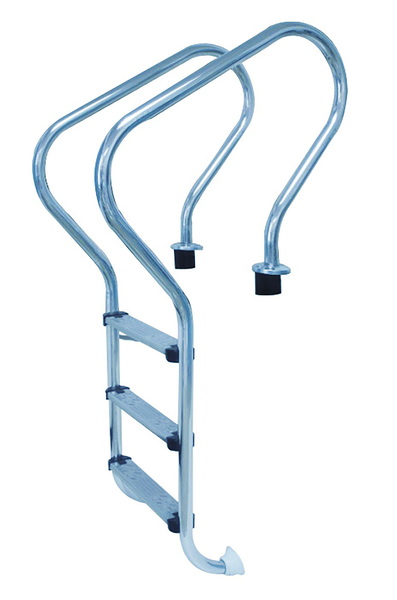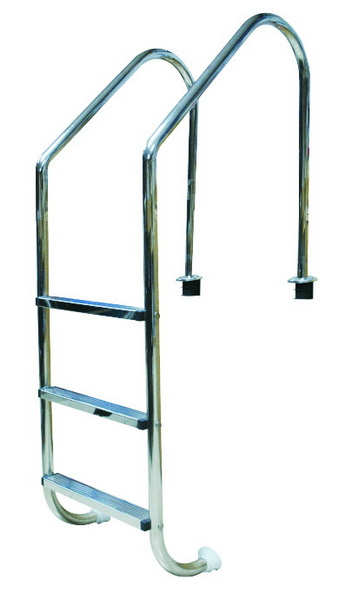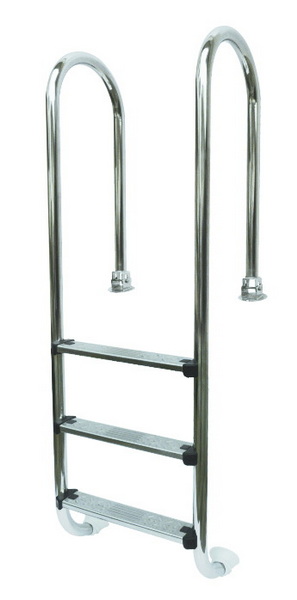Views: 222 Author: Tina Publish Time: 2025-10-03 Origin: Site








Content Menu
>> Common Causes of Floating Ladders
● Quick DIY Fixes You Can Try Today
● Professional Long-Term Solutions
>> Ladders with Integrated Ballast
>> Commercial-Grade Step Units
● Step-by-Step Guide to Stabilizing a Pool Ladder
● Maintenance Tips for Ongoing Ladder Stability
● Safety Implications of Ignoring Floating Ladders
● FAQs
>> 1. Why does my pool ladder keep floating?
>> 2. Can I safely weigh down my ladder with bricks?
>> 3. What is the cheapest DIY method?
>> 5. How often should I check ladder weights?
A floating pool ladder is one of those small but frustrating problems that can make owning a pool less enjoyable. Instead of staying firmly anchored at the bottom, the ladder drifts upward whenever you try to use it. Not only does this make swimming inconvenient, but it can also compromise safety, especially for children, elderly swimmers, and less experienced swimmers who rely on the ladder for secure access in and out of the pool. Whether you own an above-ground pool or an inground pool, keeping your ladder stable is essential.
This article explores the causes of floating pool ladders, practical DIY fixes, permanent solutions, and maintenance tips that will keep your pool safe, functional, and enjoyable throughout the swimming season.

The phenomenon of floating ladders is explained by the principle of buoyancy—an upward force exerted by water. When your pool ladder is light, hollow, or traps air inside, water pushes it upward, making it rise from its intended position.
- Air Pockets in Tubes: Hollow plastic or stainless-steel tubes may trap air, reducing their ability to sink.
- Lightweight Materials: Many ladders sold with pools are built to be affordable and lightweight, which unfortunately makes them unstable in water.
- Low-Quality Anchoring: Some ladders rely on simple resting mechanisms on the pool floor or sidewalls, which can shift under pressure.
- Improper Installation: If the ladder was not installed according to manufacturer guidelines, it may not rest properly at the bottom.
Understanding these causes helps you choose the right fix—whether it's as simple as adding weight bags or as advanced as upgrading to a ballast-ready ladder.
You don't always need to invest in a new ladder. Many pool owners find success using simple DIY solutions.
Weight bags are one of the easiest solutions. Typically made from vinyl, these can be filled with water or sand and placed at the ladder's base or directly inside the step supports.
- Affordable and reusable.
- Won't damage vinyl liners.
- Provide targeted stability where weight is needed most.
PVC pipes filled with sand or gravel make excellent DIY ballast. By sealing both ends with watertight caps, you create inexpensive, long-lasting weights. Slip these inside the hollow ladder rails or attach them to the base for added stability.
If your ladder floats due to trapped air, drill small holes near the base so water can freely fill the tubes. This reduces buoyancy and helps it sink naturally.
- Must be done carefully to prevent structural damage.
- Always smooth drilled edges to prevent sharp surfaces.
For pools with decks, securely bolting the ladder into the deck is another fix. Anchoring the ladder provides long-term stability and prevents shifting during vigorous swimming activity.

For many pool owners, DIY fixes work well. But if you want a long-lasting and worry-free ladder setup, professional-grade solutions can make the difference.
Stainless steel ladders are naturally heavier than most plastic ladders, which helps counteract floating. They also offer superior durability, corrosion resistance, and a sleek aesthetic.
Some modern ladders are designed with ballast compartments, which can be filled with sand or water. This built-in solution eliminates the need for extra weight bags.
These are specially engineered for heavy use. They often feature molded steps that rest securely against pool liners and come with large ballast chambers at their base.
To make the process even easier, here's a step-by-step approach you can apply regardless of which method you choose:
1. Inspect Your Ladder: Look for hollow areas and determine whether air or lightweight construction is the issue.
2. Choose Your Method: Decide whether you'll use weight bags, PVC tubes, vent holes, or anchoring.
3. Apply the Fix: For weight bags, place them carefully at the base. For PVC pipes, insert them into rails or secure zip-ties around the ladder supports.
4. Check Stability: Test the ladder by applying weight and entering the pool. Make sure it stays firmly in place.
5. Monitor Over Time: Recheck monthly to ensure weights haven't shifted and that anchor bolts remain tight.
Once you've secured your ladder, regular maintenance will prevent future issues.
- Rinse Ladder Regularly: Prevents buildup of algae and calcium deposits that can weaken the ladder frame.
- Tighten Fasteners: Pool vibrations and swimmer use can loosen bolts and stabilizers.
- Replace Bags Seasonally: Vinyl weight bags wear down over time, especially if exposed to intense sun.
- Inspect for Cracks: Hollow ladders can crack, allowing trapped air to shift and cause balance issues.
- Maintain Pool Chemistry: Corrosion caused by unbalanced pH can shorten ladder lifespan.
Some pool owners take ladder floating lightly, but the consequences can be dangerous.
- Risk of Accidents: Swimmers may slip if the ladder shifts while climbing.
- Child Safety: Kids rely heavily on ladder stability to get in and out of the pool.
- Elderly Access: Floating ladders are a major hazard for seniors with limited mobility.
Addressing this issue isn't just about convenience—it's about ensuring everyone in your household can swim safely.
A floating pool ladder is a common annoyance, but it doesn't need to be permanent. From quick fixes like vinyl weight bags and DIY PVC weights to professional-grade ladders with integrated ballast systems, there's a solution for every pool owner. Regular maintenance, clean anchors, and occasional inspections guarantee that your ladder remains safe, stable, and easy to use throughout the season. By addressing the root cause of buoyancy and applying the right fix, you'll enjoy a hassle-free swimming environment all summer long.

Because it is either hollow and traps air inside or lacks sufficient weight to counter water buoyancy.
Bricks are not recommended because they may damage vinyl liners. Safer alternatives include sandbags, weight bags, or ballast systems.
Filling PVC pipes with sand or gravel and sealing the ends provides one of the cheapest and most effective solutions.
Not necessarily. High-quality stainless-steel or ballast-equipped ladders typically do not float if installed and maintained properly.
Inspect your ladder weights and fasteners at least once a month during peak swimming season.
This guide explains how to safely increase pressure on a pool pump by restoring healthy water flow. Learn to diagnose low pressure, clean baskets and filters, fix air leaks, adjust valves and pump speed, and know when equipment upgrades or gauge replacement are necessary.<br />
This in‑depth guide explains how much it costs to replace a pool pump, covering typical price ranges, pump types, labor charges, and long‑term energy savings. Learn when to repair vs replace, DIY vs professional options, and how OEM pump and filter solutions can reduce lifetime ownership cost.<br />
Learn exactly how long to run a pool pump daily for crystal‑clear, safe water and lower energy bills. This in‑depth guide explains turnover, seasonal adjustments, single‑ vs variable‑speed schedules, energy‑saving tips, and practical examples, plus answers to common runtime questions.
This in‑depth guide explains the real reasons your swimming pool pump is not working, from power and priming issues to clogged impellers, dirty filters, and motor failures. Learn step‑by‑step troubleshooting, key maintenance tips, and when to repair or replace your pool pump.
Learn how to remove a pool pump motor safely and efficiently with this step‑by‑step guide. Discover the tools you need, how to disconnect power and plumbing, when to call a pro, and how OEM filter and pump solutions can support overseas pool brands and wholesalers.<br />
This article introduces leading Pool Cleaning Equipment Manufacturers and Suppliers in the UK, outlines their key products, and explains how international brands can combine UK distributors with Chinese OEM factories to build competitive, high‑quality private‑label pool cleaning and filtration lines.
This article outlines the leading Pool Cleaning Equipment Manufacturers and Suppliers in America, explains key product categories such as sand filters, pumps, and robotic cleaners, and shows how importers can combine U.S. brands with Chinese OEM partners to build competitive, high‑margin pool equipment portfolios.<br />
This article introduces the European market for pool equipment and accessories, profiles key Pool Cleaning Equipment Manufacturers and Suppliers, and explores OEM opportunities for Chinese factories producing sand filters, pumps, cleaners and LEDs for European brands and wholesalers.<br />
This article profiles top Pool Filter Valve Manufacturers and Suppliers in Canada, including Praher Plastics, global brands like Hayward and Carvin, and leading distributors. It explains key valve types, buying factors, and how foreign OEM factories can partner with Canadian suppliers for complete pool filtration solutions.<br />
Discover top Pool Filter Valve Manufacturers and Suppliers in Korea, from Korea Filter to SEDA, offering innovative multiport valves, OEM services, and eco-friendly designs for global pools. Explore advancements, certifications, and FAQs in this comprehensive guide to superior filtration solutions.
This article introduces leading Pool Filter Valve Manufacturers and Suppliers in Japan and Asia, covering valve types, key Japanese pool brands, OEM opportunities, and application segments. It explains how advanced engineering, strict quality control, and strong visual marketing help exporters win global pool projects.
This article introduces the main types of Pool Filter Valve Manufacturers and Suppliers serving Russia, including local distributors, industrial filter producers, global brands, and Chinese OEM partners. It explains key selection criteria, product ranges, and OEM opportunities for Russian pool projects.<br />
This article introduces the leading Pool Filter Valve Manufacturers and Suppliers in Australia, explains common valve types and technical features, highlights major distributors and OEM opportunities, and offers practical tips for international buyers sourcing compatible filtration valves and systems.
This article introduces Italy’s leading Pool Filter Valve Manufacturers and Suppliers, detailing their technologies, materials, OEM services, and application scenarios. It explains how Italian valves integrate with sand, DE, and cartridge filters and why global brands choose Italian partners for premium pool filtration solutions.<br />
This article introduces the Portuguese market for pool filtration equipment and highlights how local specialists, European brands, and Chinese OEM Pool Filter Valve Manufacturers and Suppliers cooperate to serve residential and commercial pools, offering multiport valves, filters, pumps, and customized OEM solutions.<br />
This guide explains how to backwash a sand pool filter step by step, when to do it based on pressure readings, and how long to run backwash and rinse cycles. It also covers common mistakes, signs that filter sand needs replacement, and key differences among sand, DE, and cartridge filters.
This article explains how often to change or clean pool filters by type, using pressure-gauge thresholds and real-world conditions. It covers cartridge, sand, and DE filter intervals, step-by-step maintenance, lifespan signs, seasonal planning, and how OEM-sized systems can reduce maintenance while keeping water crystal clear.
This in‑depth guide explains how long pool filter cartridges last, what really affects their lifespan, and the key signs it is time to replace them. Learn practical maintenance tips, filter comparisons, and OEM insights for brands, wholesalers, and pool professionals.<br />
This guide explains how to change the sand in a pool filter step by step, from shutdown and disassembly to removing old sand, inspecting laterals, adding new media, and restarting the system. It covers safety gear, sand selection, backwashing, and common FAQs for clear, safe DIY maintenance.
This article explains practical ways to hide pool filters and equipment using landscaping, fences, sheds, benches, faux rocks, and acoustic barriers. It highlights safety clearances, ventilation, and visual media ideas, helping homeowners and buyers integrate filtration systems into attractive backyards.
